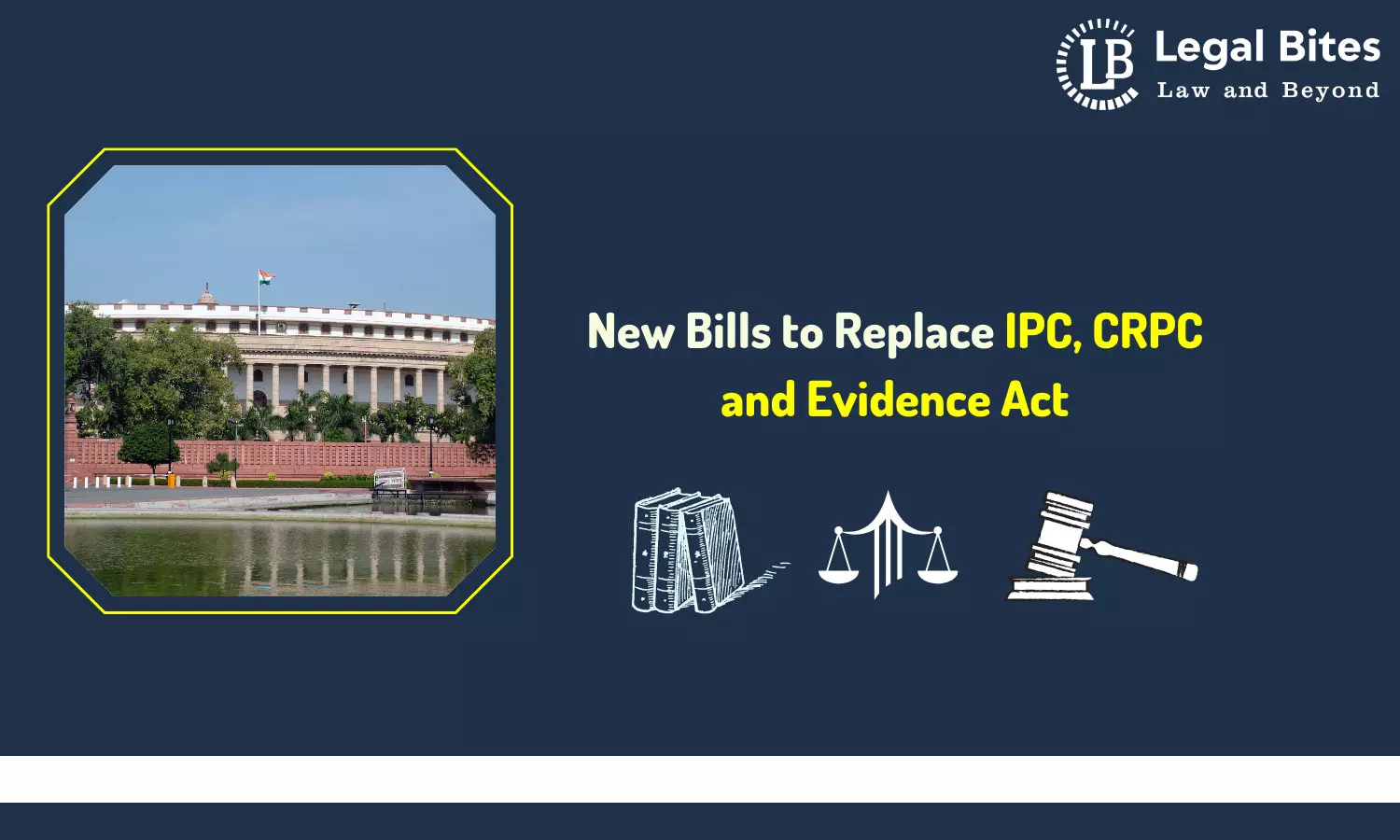New Bills to replace IPC, CRPC and Evidence Act | Revamp of Criminal Laws in India
Here's all you need 'New Bills to Replace IPC, CRPC and Evidence Act' seeks to analyze how these bills intend to make substantive changes

The article 'New Bills to Replace IPC, CRPC and Evidence Act' seeks to analyze how these bills intend to make substantive changes in the existing criminal law jurisprudence of India, and underlying aspects relating to the same.
As an initiative to completely overhaul and revamp the existing criminal justice system of India, Indian Government on 11.08.2023, introduced three new bills titled Bharatiya Nyaya Sanhita Bill, 2023, the Bharatiya Sakshya Bill, 2023 and the Bharatiya Nagrik Suraksha Sanhita Bill, 2023, replacing the old criminal laws i.e., Indian Penal Code, Indian Evidence Act and Code of Criminal Procedure, which was prevailing since the pre-independence era. As conveyed while the bills were being introduced by the Home Minister of India, these bills are primarily intended for ensuring justice and not just for prescribing punishment to the offenders.
Factual Background of the Bills
Since the last few decades, there has been a constant need to revamp the outdated criminal legislations of India prevailing since the colonial era, as the same could no longer have been practised in modern times, wherein due to technological advancements and the psychology of criminals, the natures of crime have also changed drastically.
With the introduction of new bills, the Bharatiya Nyaya Sanhita Bill, 2023 is set to replace Indian Penal Code, 1972, the Bharatiya Sakshya Bill, 2023 is set to replace Indian Evidence Act,1972, and the Bharatiya Nagrik Suraksha Sanhita Bill, 2023 is set to replace Code of Criminal Procedure,1973. These bills have been specifically formulated with the objective of bringing a paradigm shift to the criminal justice system of India, which will not only ensure speedy justice but will also ensure the integrity of evidence for higher conviction and lower pendency.
The bills which were introduced have now been referred to the Parliamentary Standing Committee for further deliberations and it is expected that the report may be tabled in the next session of the Parliament. These bills were introduced after thoroughly being reviewed by the Criminal Law Reform Committee, which was specifically constituted for the said purpose.
Criminal Law Reforms Committee
There have been various committees formed from time to time for reviewing the criminal justice system of India, whether it be Vohra Committee, Malimath Committee, Madhav Menon Committee etc. However, such committees were mainly limited to dealing with specific issues pertaining to criminal law and were not able to bring holistic reform to the legislation.
The Ministry of Home Affairs constituted a Criminal Law Reforms Committee for reviewing the said bills proposed for revamping the criminal justice system of India vide its notification dated 04.05.2020. The Criminal Law Reforms Committee was formed from esteemed individuals having a commendable hold on different fields of law. The committee included the following:
1) Professor (Dr.) Ranbir Singh is the former Vice Chancellor of the National Law University (NLU) of Delhi. He was the Chairman of the Committee.
2) Professor G.S. Bajpai, who is the Registrar of the National Law University (NLU) of Delhi.
3) Mr. Balraj Chauhan, who is the Vice-Chancellor of the National Law University of Jabalpur.
4) Mr. Mahesh Jethmalani, who is a renowned Senior Advocate of the Supreme Court.
5) Mr. G.P. Thareja, former district and session judge, Delhi.
Despite being formed with the purpose of recommending reforms in the criminal legislation of the country in a principled, effective and efficient manner for the Country, the committee was also a matter of controversy, since it was alleged for having a lack of diversity. However, it was duly clarified from time to time that the committee holds remarkable diversity and competence since the same was formed based on the professional experience and affiliations of the individuals. The Committee invited the inputs from stakeholders through an extensive questionnaire and analyzed such inputs which were received. The said committee submitted its final recommendations on 27.07.2022, and the bills were finally introduced on 11.08.2023.
Key Highlights of the Proposed Changes
Since criminal laws require utmost certainty and continued interpretation in order to be implemented in their nature and spirit, amending or replacing them is a strong step taken by the Indian Government. However, such modifications and reforms will be under the scanner and would require considerable time to be absorbed within the Indian legal system. Amongst others, the following are some of the key reforms which have been proposed through the new bills:
1) The Bharatiya Nyaya Sanhita Bill, 2023
- The Bhartiya Nyaya Sanhita (BNS) Bill, 2023 containing 356 provisions in total, will repeal 22 provisions and modify 175 existing provisions of the Indian Penal Code. The said bill has also introduced nine new sections and also prescribes provisions for new offences such as organized crimes, offences for terrorist acts, mob lynching, and a modified provision for sedition i.e., Section 150.
- The bill prescribes imprisonment of 20 years or life imprisonment for gang rapes and the death penalty for the rape of a minor. In addition to the same, the bill also prescribes imprisonment of 10 years for sexual intercourse under the false pretext of marriage and deceitful means.
- The bill also prescribes community services as a punishment for committing certain specific offences, which was much needed in India.
- The bill doesn’t prescribe any provision for the offence of adultery nor does it have any provision criminalizing unnatural sexual offences against men.
2) Bharatiya Nagarik Suraksha Sanhita Bill, 2023
- Bharatiya Nagarik Suraksha Sanhita (BNSS) containing a total of 533 sections, will repeal nine provisions and modify 107 existing provisions of the Code of Criminal Procedure. The bill proposes to add a new provision specifically prescribing that a copy of the FIR is made available to the accused and the victim free of cost and within fourteen days from the date of production or appearance of the accused.
- The bill also proposes to include new methods such as examination through video conferencing and other electronic means in line with the technological advancements in the present-day context. The bill also makes videography of statements made by survivors of sexual violence mandatory, in order to prevent any manipulation later.
- The bill prescribes mandatory summary trials for cases which are petty/less serious and pre-consultation of victims before the withdrawal of cases lodged for offences punishable for more than seven years.
- The bill has modified the period of police custody for an arrested person from 60 days to 90 days and prescribed a time period for filing mercy petitions within Thirty days before Governor and sixty days before the President.
3) Bharatiya Sakshya Bill, 2023
- Bharatiya Sakshya Bill (BSB) containing a total of 170 sections, will repeal five existing provisions and modify 23 existing provisions of the Indian Evidence Act.
- The bill, as an attempt to revamp the methods of collecting evidence, prescribes the admissibility and legal validity of electronic or digital records as documentary evidence and also prescribes expert opinion as a recognized form of evidence.
- The bill also prescribes videography during the raids and during the process of investigation.
- The most important aspect of this bill is that it has introduced the presumption of innocence to be the fundamental principle of the Indian criminal justice system, which is a commendable step.
Way Forward for the Proposed Bills
Based on the holistic overview of the bills, it can be easily inferred the proposed modifications are majorly with an intent to simplify the criminal justice system and modernizing the same at the same time. It is evident that the intent of the government is to address the changing psychology behind crimes, and modern technology, and reflect the same in the concerned legislation.
The introduction of new offences which were much needed such as organized crime, terrorism offences, endangering sovereignty, mob lynching, sexual intercourse by deceitful means and a false promise to marry, which were absent in the previous statute, have been introduced in the proposed statute, which are expected to bring exceptional results.
The newly introduced bill prescribing stricter punishment for crimes against women and children, which is a welcoming move. The bills also ensure accountability of officers, time-bound trials etc. which will be considered high points of the bills in the coming times.
The bills have been introduced keeping in mind the technological advancement which has been made to date and endeavours to include the same within the criminal justice system of the country, and it is expected that it will eventually increase the utilization of electronic evidence from the investigation process to the adjudication process.
Despite being a reformative legislative initiative, the implementation of the said bills might pose challenges before the government since the same has been framed through a narrower consultation process from the stakeholders and based on existing infrastructure. However, modification in the legislative framework would also require modification in every related aspect in order to be implemented in its letter and spirit.
Conclusion
The introduction of the new bills has highlighted the fact that laws should be adaptable to the evolving society and technology instead of being rigid. Despite the same, the legal fraternity specifically those practising criminal laws are surprised by the introduction of these new statutes and critical analysis for the same has already begun.
However, it will imperative to see whether the revamping of criminal legislation will also revamp the criminal justice system for the smooth functioning of our democracy, or it will be merely an old wine in a new bottle.
Even though there have been mixed views about the bills, one cannot deny the harsh truth that the outdated Indian criminal legislations prevailing since the colonial era needed modification, as the same could not have been practised in modern times, wherein the natures of crime, psychology of criminals as well as technology have changed drastically, and it will be expected that the newly introduced bills ensure such a criminal justice system, which serves the need of society effectively and ensures the rule of law.
References
[1] Union Home Minister and Minister of Cooperation, Shri Amit Shah introduces the Bhartiya Nyaya Sanhita Bill 2023, the Bharatiya Nagarik Suraksha Sanhita Bill, 2023 and the Bharatiya Sakshya Bill, 2023 in the Lok Sabha, Available Here
[2] Highlights of Bills Replacing IPC, CrPC & Evidence Act as Stated By Union Home Minister, Available Here
[3] Bharti Mishra, Analysis: Breaking Down The Proposed Reforms In Indian Criminal Laws, Available Here
[4] Araatrika Bhaumik, Sedition ‘repealed’, death penalty for mob lynching: the new Bills to overhaul criminal laws, Available Here

